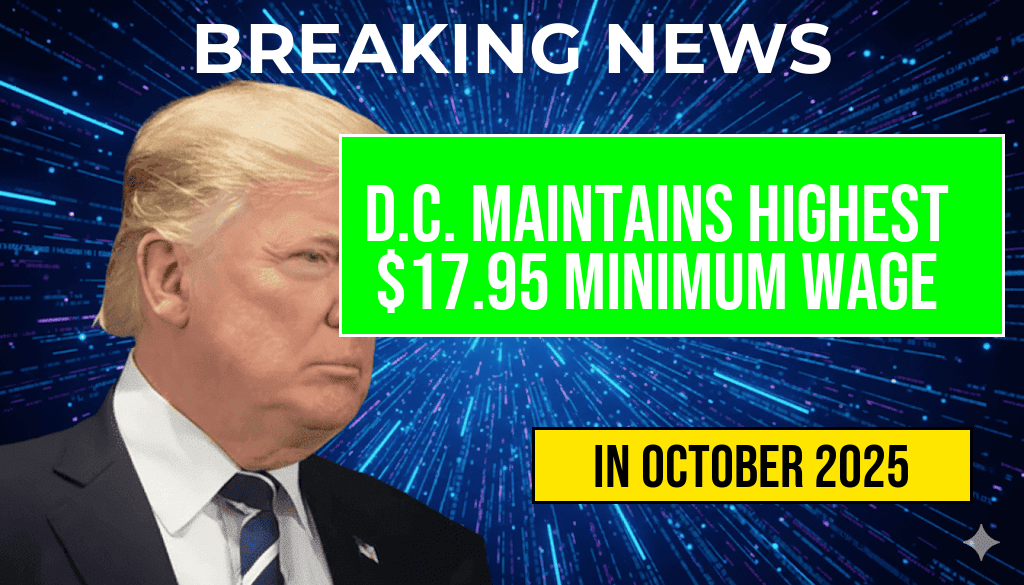Washington D.C. has solidified its position as the U.S. city with the highest minimum wage, standing at $17.95 per hour as of 2024. The city’s ongoing commitment to increasing wages reflects broader efforts to address income inequality and improve living standards for workers in the nation’s capital. This wage rate surpasses those of neighboring states and major metropolitan areas, emphasizing D.C.’s unique economic and political landscape. The city’s minimum wage has seen consistent growth over recent years, driven by local legislation and advocacy from labor groups. Meanwhile, policymakers face ongoing debates about the economic impacts of wage hikes, particularly concerning small businesses and employment rates. As the city continues to navigate these challenges, the minimum wage remains a focal point of economic policy discussions, illustrating D.C.’s leadership in setting a high standard for workers across the country.
Washington D.C. Maintains its Lead in Minimum Wage Standards
As of 2024, Washington D.C. remains at the forefront of federal and state wage policies, setting a benchmark with its current minimum wage of $17.95 per hour. This figure, established through local legislation, exceeds the federal minimum wage of $7.25 and the minimums of many states and cities. The District’s approach reflects a broader trend among urban centers prioritizing higher wages to combat rising living costs and economic disparities.
Historical Progression of D.C. Wage Policies
The District’s minimum wage has experienced steady increases over the past decade. From $8.25 in 2014, the wage has nearly doubled, with incremental hikes approved by the D.C. Council. The city’s wage policy is designed to keep pace with inflation and the cost of living, which has surged due to housing costs, transportation, and other essentials.
| Year | Minimum Wage |
|---|---|
| 2014 | $8.25 |
| 2018 | $12.50 |
| 2020 | $15.00 |
| 2022 | $16.10 |
| 2024 | $17.95 |
Legislative Drivers and Economic Impact
The city’s minimum wage laws are rooted in legislation aimed at promoting economic equity. The District of Columbia’s Living Wage Act and subsequent amendments have played crucial roles in setting and raising wages. Local officials argue that higher wages contribute to reduced poverty levels and increased consumer spending, which benefits the local economy.
However, some small business owners have expressed concern about the rising wage floor, citing increased labor costs as a challenge. Studies from organizations such as the Brookings Institution suggest that moderate wage increases can be absorbed through higher productivity and price adjustments, but rapid hikes may cause employment shifts.
Comparative Analysis of Major U.S. Cities
Washington D.C. outpaces other large U.S. cities in minimum wage rates, including:
- San Francisco: $16.99 per hour (2024)
- Seattle: $17.28 per hour (2024)
- New York City: $15.00 per hour (statewide minimum, with city-specific adjustments)
Despite these figures, D.C.’s wage remains the highest among major metropolitan areas, underscoring the city’s unique political and economic stance on worker compensation.
Future Outlook and Policy Considerations
Looking ahead, policymakers in Washington D.C. are contemplating further increases aligned with inflation and economic conditions. Proposals for a $18.00 per hour minimum wage are currently under review, with advocates emphasizing the need to sustain living standards amid ongoing inflationary pressures.
Labor organizations continue to push for policies that support fair wages, citing research from sources like the National Employment Law Project that highlights the benefits of living wages for both workers and communities.
Implications for Workers and Employers
The sustained elevation of D.C.’s minimum wage influences various sectors, from hospitality and retail to public service. For workers, the increased pay translates into better financial stability and access to services. Conversely, some employers face the challenge of managing higher payroll expenses, which could impact hiring practices and pricing strategies.
Experts suggest that balanced policy approaches—combining wage increases with support for small businesses—are essential for maintaining economic vitality while ensuring workers receive fair compensation. The city’s ongoing efforts to monitor economic indicators and adjust policies accordingly will likely shape the landscape of minimum wage standards in the years to come.
Frequently Asked Questions
What is the current minimum wage in Washington D.C.?
The minimum wage in Washington D.C. is currently set at $17.95 per hour, making it the highest in the United States.
Why does Washington D.C. have the highest minimum wage?
Washington D.C. maintains the highest minimum wage due to ongoing efforts to ensure fair pay for workers and to reflect the city’s cost of living and economic conditions.
How does Washington D.C.’s minimum wage compare to other states?
Washington D.C.’s minimum wage surpasses that of most states, positioning it as a leader in establishing a living wage for workers nationwide.
Are there plans to increase the minimum wage further?
While the article highlights the current rate, local policymakers are continually evaluating economic factors, and future wage increases may be considered to support workers.
Who is affected by the minimum wage law in Washington D.C.?
The minimum wage applies to most employee sectors within the city, impacting retail workers, hospitality staff, and other hourly employees.

Leave a Reply